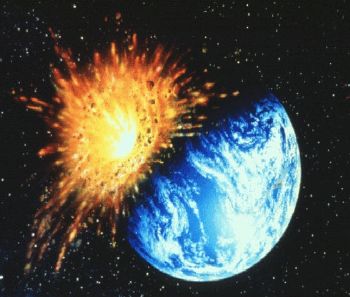by Larry
April, 2004Long OddsComparing the statistics of occurrences for which the chances are quite small can be interesting. I've heard the odds of another nuclear war in my lifetime are estimated to be about one in 10, of our being killed by a colossal meteor one in 50,000, and of being destroyed by space aliens less than one in several million, about the same odds as of my winning big with the lottery (even if I regularly bought tickets, which I don't). Toward the end of the Cretaceous period there were a few species of fairly primitive shrew-like ground dwelling creatures, the first mammals. Still in the age of dinosaurs, the odds of this insignificant animal family becoming our sphere's dominant set of vertebrates were so long that it's likely no cosmic bookmaker would have even arranged such a silly bet. But then something happened that changed everything.
The object that hit our orb was so immense that as it was smashing the surface it's trailing edge was still over 30,000 feet above sea level. Following the initial effects of impact, dust and soot would have blocked the sun for a quite extended period, at least many months if not years. Most, but not all, of the earth's forests and their fauna would have been destroyed or soon died out, opening vast new niches for the evolutionary development of the survivors, including of course mammals. Even if only via very long odds, positive change (at least from our perspective) can come from incredible trauma and tragedy. The likelihood of a Chicxulub impact was so small that there has never again since been even close to so dramatic a collision with earth. Yet, thanks to those odds coming to fruition, the eventual emergence of Homo sapiens was made possible. Of course there may now be equally long odds against the demise of our own global hegemony. Unlikely as it may be, one day the descendants of some lowly species we consider inconsequential, the kiwi bird for instance, perhaps will fill a niche similar to that we do today.
Sources: The Day the World Burned. David A. Kring and Daniel D. Durda in Scientific American, Vol. 289, No. 6, pages 98-105; December 2003. A Short History of Nearly Everything Bill Bryson. Broadway Books, 2003. |
 65,000,000 years ago, as discovered in the early 1990s, a large asteroid or comet (now called Chicxulub), with its associated debris, entered our atmosphere at forty times the speed of sound, so fast that it compressed the air ahead of each speeding chunk, briefly raising the atmospheric temperature to hotter than the surface of the sun and igniting vegetation over much of the globe. A second after Chicxulub first impacted the upper atmosphere, it slammed into a shallow ocean, what is now the Gulf of Mexico, adjacent to the present Yucatan Peninsula, instantly hurtling on through the sea floor and the earth's crust. It vaporized immediately on impact. At the same time the collision would have vaulted upward a huge volume of molten matter, some even into outer space. In less than an hour, vaporous ejecta would have surrounded the world. As a mixture of liquid and rocky material from this globally spread plume fell back to earth, it would have been like countless meteors hitting the planet almost simultaneously.
65,000,000 years ago, as discovered in the early 1990s, a large asteroid or comet (now called Chicxulub), with its associated debris, entered our atmosphere at forty times the speed of sound, so fast that it compressed the air ahead of each speeding chunk, briefly raising the atmospheric temperature to hotter than the surface of the sun and igniting vegetation over much of the globe. A second after Chicxulub first impacted the upper atmosphere, it slammed into a shallow ocean, what is now the Gulf of Mexico, adjacent to the present Yucatan Peninsula, instantly hurtling on through the sea floor and the earth's crust. It vaporized immediately on impact. At the same time the collision would have vaulted upward a huge volume of molten matter, some even into outer space. In less than an hour, vaporous ejecta would have surrounded the world. As a mixture of liquid and rocky material from this globally spread plume fell back to earth, it would have been like countless meteors hitting the planet almost simultaneously.